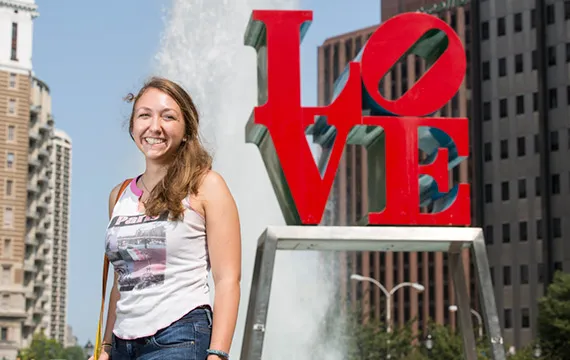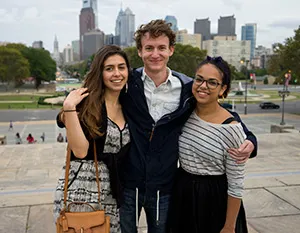Swarthmore and the City

Kailyn Faye Witonsky '16, an English Literature major from Centennial, Col., spent this past summer researching pediatric headaches at the Children's Hospital of Philadelphia.
Swarthmore students often regard Philadelphia as a city out of a dream. Nearby and full of untold riches, including concerts, food trucks, parks, and culture, Philadelphia offers manifold opportunities to explore the unfamiliar. But despite these attractions, the journey itself vexes many students. To help bridge the distance between the two - which is in reality only a short ride by train - a number of College initiatives, some new and some well-established, and a network of local alumni are linking students to the abundant resources and opportunities in Philadelphia.
SwatDeck, a new program that recently won a $10,000 community development grant from the College, offers students the chance to venture into Philadelphia free of cost. SwatDeck matches four random students by way of playing cards in their mailboxes and equips them with cash, SEPTA train tickets, and a list of discussion questions to fuel a day-long adventure in the city. Last semester, SwatDeck sponsored 185 participants who explored many corners of the city, from the artscape of Philadelphia's Magic Gardens to Eastern State Penitentiary, known as "America's most historic prison."
"Swarthmore's proximity to Philly guarantees an eclectic array of adventures that are just a SEPTA ride away," says Raven Bennett '17, a Santa Monica, Calif. native and one of SwatDeck's four co-founders.
Emma Kates-Shaw '16 of Ossinging, N.Y., another SwatDeck co-founder, appreciates the program's emphasis on the spontaneity and freedom of adventure. "I think one of the coolest responses we kept hearing was that people enjoyed getting lost or not having an explicit plan," she says. "SwatDeck really emphasizes an organic sense of adventure: get lost, discover new things about the city, and most importantly, document those discoveries so future SwatDeck-ers have a broader sense of everything Philly has to offer."
While SwatDeck provides students with opportunities for adventure and exploration, other College programs link students with Philadelphia resources that can greatly enhance their academic and career pursuits. One such program is the Early Novels Database (END), led by Associate Professor of English Literature Rachel Buurma '99 in conjunction with the University of Pennsylvania's Rare Book and Manuscript Library. This bibliographic data project includes detailed, student-researcher-created information about early fiction by canonical authors and less well-known novelists alike. Each summer, students work to create and manipulate bibliographic datasets while participating in the END Summer Seminar, in which they work on individual projects, participate in workshops, and discuss new scholarship in the field. Over the last five summers, 15 student researchers from Swarthmore, Bryn Mawr College, and Penn have created rich records of over 1,000 early novels, created projects ranging from interactive maps to data visualizations to blog posts, and have presented project results at several scholarly conferences in Philadelphia and elsewhere.

SwatDeck members (from left): Raven Bennett '17, Conor Heins '15, and Emma Kates-Shaw '16
END leaders and researchers have spent time in many Philadelphia-area libraries, including Swarthmore's McCabe Library, Penn's Rare Book and Manuscript Library, Bryn Mawr's Canaday Library, the Rosenbach Museum and Library, and the Library Company of Philadelphia.
"I think the students have found the chance to work across multiple institutional contexts with many librarians and scholars really exciting," says Buurma, who sees connections between the Tri-Co and Philadelphia as "inherent to END's multi-institutional collaborative structure."
The Music Department, which offers private lessons for credit through its Music 48 class, also encourages students to take advantage of Philadelphia's resources by providing student instrumentalists with the opportunity to study with a teacher of their choice in the Philadelphia area. Through the program, students have trained with faculty from the Curtis Institute of Music and members of the Philadelphia Orchestra. The Music Department also provides a subsidy, sometimes 100 percent of the cost of lessons, and gives academic credit for private lessons.
Associate in Performance and Concert Manager Andrew Hauze '04 sees Music 48 as just one of many opportunities for Swarthmore students to broaden their musical horizons, citing the hundreds of concerts that offer either free tickets or "outrageously good deals" all year round.
"Philadelphia is one of the most important musical centers in America," Hauze states. "The experience of attending concerts and masterclasses at the Philadelphia Orchestra, the Curtis Institute of Music, the Opera Company of Philadelphia, the Philadelphia Chamber Music Society, and the Academy of Vocal Arts, to name just a few, is absolutely priceless. I view the musical institutions of Philadelphia as vital extensions of a Swarthmore student's musical diet."
In addition to exploring Philadelphia during the academic year, many students take advantage of the summer months to work or intern in the city. Kailyn Faye Witonsky '16, an English literature major from Centennial, Col., spent this past summer researching pediatric headaches at the Children's Hospital of Philadelphia. With a monthly pass that granted her the freedom to explore on weekends, Witonsky discovered new activities, art, and food.
"The diversity of Philadelphia and ability to explore so many nooks and crannies is exhilarating," Witonsky says. "I think that it is really a very beautiful city with incredible details just waiting to be discovered by both the interested tourist and the well-seasoned city-goer. Also, the food!"
After Swarthmore, many alumni settle in Philadelphia, often because of the presence of pre-existing Swarthmore communities in which they feel welcome. Maddie Charne '14 spent last summer working in Philadelphia and is living in the city's Francisville neighborhood, near Fairmount, this year. Through her summer work with various theatrical productions in the city, Charne had a chance to familiarize herself with her new home and strengthen her connections with Philadelphia's theater community.
"I have gotten an amazing chance to get to know Philly artists and theater," Charne says, "and I have seen shows and gone to galleries that I never knew existed."
Dinah Dewald '13 lives in West Philadelphia as a member of the Maypop Collective for Climate and Economic Justice, a group of Swarthmore alumni who now live together and advocate for a variety of social and environmental causes. "From a social-change standpoint, Philadelphia is a really exciting city because there's a rich history of community organizing," Dewald explains. "It's also a focal point of many issues that are cruxes for the ongoing movement for social justice. I love the city so much more now that I live here."
Although students may often regard Philadelphia as somewhat distant, those who make their way find it accessible, eclectic, and inspiring. As Charne puts it: "I never realized how many different things Philadelphia could be."



